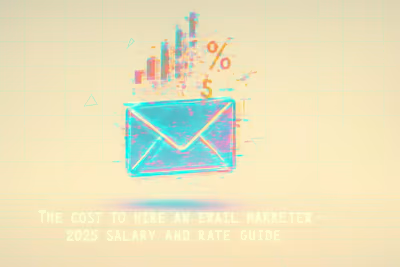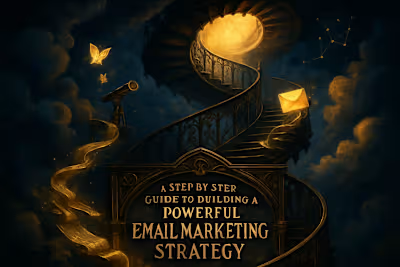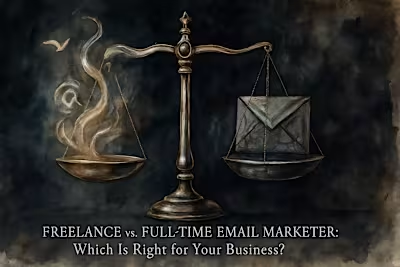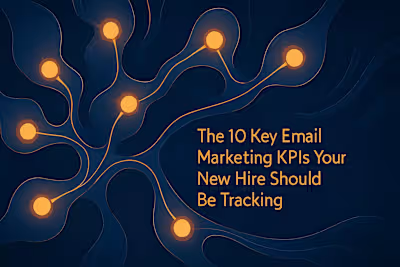10 Must-Have Email Marketing Tools Your New Hire Should Master
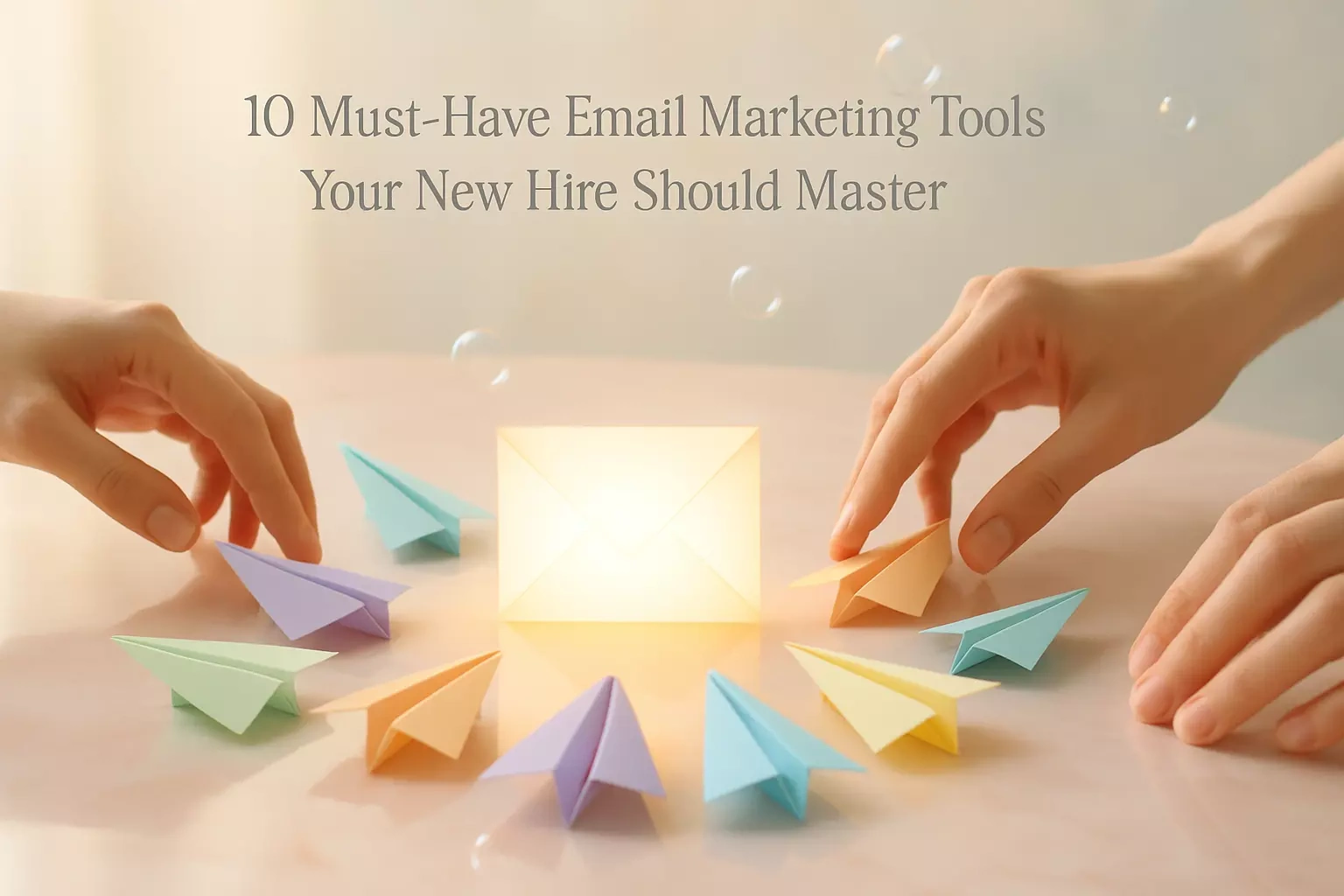
10 Must-Have Email Marketing Tools Your New Hire Should Master
Core Platform: Email Service Providers (ESPs)
1. All-in-One Marketing Platforms
2. E-commerce Focused Platforms
3. General Email Marketing Platforms
Supporting Tools for Analytics and Optimization
4. Web Analytics Tools
5. A/B Testing and Personalization Tools
6. Email Deliverability and Verification Tools
Creative and Productivity Tools
7. Design and Image Editing Tools
8. Project Management Software
9. Copywriting and Editing Tools
10. Customer Relationship Management (CRM) Systems
Conclusion
References
10 Must-Have Email Marketing Tools Your New Hire Should Master
A skilled email marketer is only as effective as the tools they use. When you hire an email marketer, you're not just looking for someone who can write catchy subject lines – you need someone who can navigate the complex ecosystem of modern email marketing software. From campaign creation to automation, analytics to design, today's email marketers need to be tech-savvy professionals who can leverage multiple platforms seamlessly.
The right tools can make the difference between a mediocre campaign and one that drives real results. That's why technical proficiency is such a crucial part of building a powerful email marketing strategy. Before you start thinking about how much it costs to hire an email marketer, let's explore the essential tools they should master to deliver value from day one.
Core Platform: Email Service Providers (ESPs)
Think of the ESP as mission control for your email marketing efforts. It's where campaigns come to life, where data tells its story, and where automation works its magic. Without solid ESP skills, even the most creative marketer will struggle to execute their ideas effectively.
The ESP landscape has evolved dramatically over the past few years. What used to be simple email blast tools have transformed into sophisticated platforms that can predict customer behavior, automate complex workflows, and integrate with dozens of other marketing tools. Your new hire needs to understand not just how to use these platforms, but how to choose the right one for your specific needs.
1. All-in-One Marketing Platforms
HubSpot and ActiveCampaign represent the Swiss Army knives of email marketing. These platforms don't just send emails – they manage your entire customer relationship lifecycle. For businesses looking to consolidate their tech stack, these tools offer incredible value.
HubSpot shines when you need tight integration between sales and marketing. Your email marketer can see exactly where a contact is in the sales pipeline and tailor messages accordingly. They can trigger emails based on website behavior, form submissions, or even sales activities. The learning curve is steeper than simpler tools, but the payoff in terms of sophisticated automation is worth it.
ActiveCampaign takes a slightly different approach, focusing heavily on automation capabilities while remaining more accessible to smaller teams. A proficient email marketer should be able to build complex automation sequences that nurture leads through multiple touchpoints. They should understand how to use conditional logic, goal tracking, and split testing within these workflows.
The real power of these platforms comes from their CRM integration. Your email marketer isn't working in a silo – they're contributing to a unified view of each customer. This means they need to understand data hygiene, proper tagging systems, and how their work impacts other teams.
2. E-commerce Focused Platforms
If you're in e-commerce, Klaviyo is the name that keeps coming up – and for good reason. This platform speaks the language of online retail fluently. Your email marketer should understand how to leverage purchase data, browsing behavior, and customer lifetime value to create highly targeted campaigns.
What sets e-commerce platforms apart is their deep integration with shopping platforms. A skilled marketer can create abandoned cart sequences that feel personal, not pushy. They can segment customers based on purchase frequency, average order value, or product categories. They understand that a customer who bought running shoes might be interested in athletic wear, but not necessarily formal shoes.
Beyond basic segmentation, these platforms offer predictive analytics. Your email marketer should know how to use features like predicted lifetime value or churn risk to prioritize marketing efforts. They should be comfortable creating dynamic product recommendations that actually drive sales, not just fill space in emails.
The key skill here is understanding the customer journey in e-commerce. It's not just about sending promotional emails – it's about creating a cohesive experience from browse to purchase to retention. Your marketer needs to think like a retailer, not just a communicator.
3. General Email Marketing Platforms
Don't underestimate the power of simplicity. Mailchimp and Constant Contact have built empires by making email marketing accessible. For many businesses, especially those just starting their email journey, these platforms offer the perfect balance of features and usability.
A proficient email marketer should be able to maximize these seemingly simple tools. They know that Mailchimp's strength lies in its template builder and ease of use, making it perfect for teams without dedicated designers. They understand how to use tags and segments creatively to achieve personalization without complex automation.
These platforms excel at the fundamentals. Your marketer should be able to create beautiful, mobile-responsive emails quickly. They should understand how to interpret basic analytics and make data-driven improvements. Most importantly, they should know when these tools are sufficient and when it's time to upgrade to something more robust.
The trap many marketers fall into is assuming these tools are "beginner only." In reality, a skilled marketer can achieve impressive results with these platforms by focusing on strategy over features. Sometimes the best tool is the one your entire team can actually use.
Supporting Tools for Analytics and Optimization
Great email marketing is equal parts art and science. While the ESP handles the sending, a whole ecosystem of tools helps marketers understand what's working and what isn't. Your new hire needs to be comfortable diving into data and extracting actionable insights.
The modern email marketer is part analyst, part strategist. They need to connect the dots between email performance and business outcomes. This requires proficiency with tools that go beyond basic open and click rates.
4. Web Analytics Tools
Google Analytics is non-negotiable. Your email marketer needs to understand how their campaigns drive actual business results, not just email metrics. They should be setting up UTM parameters for every campaign, tracking goal completions, and understanding the full customer journey.
But it goes deeper than basic tracking. A skilled marketer knows how to create custom segments to analyze email traffic separately. They can identify which email campaigns drive the most valuable visitors – those who browse multiple pages, spend time on site, or complete desired actions. They understand that a high click rate means nothing if those clicks don't convert.
Advanced practitioners use Google Analytics to inform their email strategy. They notice that blog subscribers have different behavior patterns than product page visitors. They see which content topics drive the most engagement and adjust their email content accordingly. They're not just reporting on what happened – they're using data to predict what will work next.
The integration between email and web analytics reveals the true ROI of email marketing. Your marketer should be comfortable presenting this data to stakeholders, showing how email contributes to the bigger picture. They need to speak the language of business metrics, not just email metrics.
5. A/B Testing and Personalization Tools
Testing isn't optional anymore – it's essential. While most ESPs include basic A/B testing, your email marketer needs to go beyond testing subject lines. They should have a systematic approach to testing every element of their campaigns.
True testing proficiency means understanding statistical significance. Your marketer shouldn't declare a winner after 100 opens. They need to know how sample size affects reliability and when a test has run long enough to draw conclusions. They should be comfortable testing multiple variables while maintaining clean, interpretable results.
But testing is just the beginning. Modern personalization goes far beyond "Hi [First Name]." Your marketer should understand dynamic content blocks, behavioral triggers, and predictive personalization. They need to balance the desire for personalization with the risk of being creepy. Nobody wants emails that feel like surveillance.
The best marketers treat testing as an ongoing process, not a one-time activity. They maintain a testing calendar, document results, and build a knowledge base of what works for your specific audience. They understand that what works for one company might fail for another, so they test everything.
6. Email Deliverability and Verification Tools
Deliverability is the unsexy but crucial foundation of email marketing. Your emails can't drive results if they never reach the inbox. A competent email marketer understands this and takes deliverability seriously.
Email verification tools help maintain list hygiene by identifying and removing invalid addresses before they damage your sender reputation. Your marketer should know when to use these tools – typically before major campaigns or when onboarding new lists. They understand that a smaller, cleaner list outperforms a larger, dirty one every time.
Beyond verification, deliverability monitoring tools help track where emails are landing. Are you hitting the inbox, promotions tab, or spam folder? Your marketer needs to understand factors affecting deliverability: sender reputation, content quality, engagement rates, and technical setup. They should be comfortable working with IT to ensure proper authentication (SPF, DKIM, DMARC) is in place.
List hygiene isn't a one-time cleanup – it's an ongoing practice. Your marketer should have strategies for re-engaging inactive subscribers before removing them. They understand that every unengaged subscriber hurts deliverability, so they're proactive about maintaining a healthy list.
Creative and Productivity Tools
Email marketing isn't just about data and delivery – it's about creating compelling content that resonates with your audience. The tools in this category help marketers work more efficiently and produce better results.
The best email marketers are organized, creative, and collaborative. They need tools that support all three aspects of their work. While they don't need to be designers or project managers, they need to work effectively with both.
7. Design and Image Editing Tools
Visual content drives engagement, but not every email marketer is a designer. Tools like Canva bridge this gap, allowing marketers to create professional-looking graphics without extensive design training. Your ideal candidate knows their limitations and uses these tools effectively.
A skilled email marketer understands basic design principles. They know that consistency builds brand recognition. They can resize images for optimal loading speed. They understand how different email clients render images and plan accordingly. Most importantly, they know when to use images and when text is more effective.
Working with designers requires its own skill set. Your marketer should be able to provide clear creative briefs, offer constructive feedback, and understand design timelines. They need to balance their vision with practical constraints like file sizes and rendering issues. They're the bridge between creative ideals and technical realities.
The key is efficiency without sacrificing quality. Your marketer should have a library of templates and assets they can quickly customize. They understand that perfect is the enemy of done, but they never compromise on brand standards. They can produce visually appealing emails on tight deadlines without burning out the design team.
8. Project Management Software
Email marketing involves juggling multiple campaigns, deadlines, and stakeholders. Without proper project management, even talented marketers can drop the ball. Proficiency with tools like Asana, Trello, or Monday.com isn't just nice to have – it's essential for scaling your efforts.
A well-organized email marketer creates transparent workflows that everyone can follow. They build campaign calendars that account for design time, approval processes, and testing periods. They understand that last-minute rushes lead to mistakes, so they plan ahead and communicate proactively.
These tools also facilitate collaboration. Your marketer needs to coordinate with content creators, designers, product teams, and sales. They should be comfortable assigning tasks, setting deadlines, and following up without being a bottleneck. They understand that email marketing is a team sport.
The best marketers use project management tools strategically. They create templates for recurring campaigns, maintain asset libraries, and document processes. They're not just managing today's campaigns – they're building systems that make future campaigns easier. They think in terms of scalability and efficiency.
9. Copywriting and Editing Tools
Words matter in email marketing. Even the most beautiful design falls flat with poor copy. Tools like Grammarly and Hemingway App help ensure every email maintains professional standards. Your marketer doesn't need to be Hemingway, but they need to communicate clearly and correctly.
Beyond basic grammar checking, these tools help maintain consistent voice and tone. Your marketer should understand how to adjust writing style for different audiences and purposes. A promotional email requires different language than a customer service update. They need to switch contexts seamlessly while maintaining brand consistency.
The best email copywriters understand that less is often more. They use these tools to identify complex sentences and simplify them. They know that mobile readers have limited attention, so they front-load important information. They write scannable emails with clear hierarchy and compelling calls-to-action.
But tools are just aids – the real skill is understanding your audience. Your marketer needs to write copy that resonates emotionally while driving action. They should be testing different approaches, analyzing results, and refining their style based on what works. They're students of both language and human psychology.
10. Customer Relationship Management (CRM) Systems
The CRM is the beating heart of modern marketing, especially in B2B contexts. Your email marketer needs to understand how to leverage CRM data for segmentation, personalization, and timing. This isn't just about technical skills – it's about strategic thinking.
A proficient marketer knows how to navigate the CRM to find the data they need. They understand different contact properties, can build complex segments, and know how to maintain data quality. They're not just users of the CRM – they're advocates for keeping it clean and updated.
The real value comes from connecting CRM insights to email strategy. Your marketer should identify patterns in customer behavior and create campaigns that address specific needs at the right time. They understand that a lead who just attended a webinar needs different messaging than one who's been inactive for six months.
Integration between CRM and email platforms is crucial. Your marketer needs to ensure data flows smoothly in both directions. Email engagement should update CRM records, and CRM changes should trigger appropriate email sequences. They think in terms of unified customer experiences, not isolated channels.
Conclusion
The email marketing landscape continues to evolve, and the tools your team uses can make or break your success. When evaluating candidates, look beyond basic platform knowledge. You want someone who understands how different tools work together to create cohesive, effective campaigns.
The best email marketers are perpetual learners. They stay current with new features, test emerging platforms, and aren't afraid to recommend changes when better tools become available. They balance technical proficiency with strategic thinking, using tools as enablers rather than crutches.
Remember, tools are just that – tools. The real value comes from how your email marketer uses them to understand your audience, craft compelling messages, and drive business results. Look for candidates who can demonstrate not just tool knowledge, but strategic application of these platforms to solve real business challenges.
As you build your email marketing team, prioritize versatility and learning ability over expertise in any single platform. The marketer who can quickly adapt to new tools while maintaining focus on results will serve your organization well for years to come. After all, the tools will change, but the fundamentals of great email marketing remain constant: know your audience, deliver value, and measure everything.
References
Like this project
Posted Jun 14, 2025
The right tools empower a great email marketer. Explore the essential software categories, from email service providers to analytics, that your new hire needs to know.








